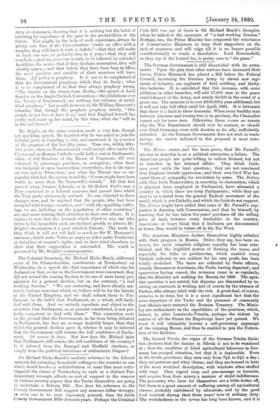Mr. Bright, on the same occasion, made a very fine,
though not sparkling speech. He inquired why he was asked to join the Liberal party in founding a club, and answered it by a review of the progress of the last fifty years. Time was, within fifty- two years, when no Nonconformist could accept office under the Crown and no Roman Catholic could hold a seat in Parliament ; when of 658 Members of the House of Commons, 487 were returned by patronage, purchase, or corruption ; when there was incipient or open insurrection everywhere, due to the taxes on corn and to Protection ; and when the Throne was so un- popular, that had the system lasted the " Crown might have been worth no more than Mr. Turnerelli's wreath." All that had passed away, because Liberals, or in Sir Robert Peel's case, a Tory converted to a Liberal measure, had passed laws which the Tory party strenuously resisted. No one objected to those changes now, and he rejoiced that the people, who had been occupied with foreign countries, and "with the appalling suffer- ings we are inflicting on the population of other countries," are once more turning their attention to their own affairs. It is curious to note that the journals which object to any one who refers to the immediate past, are inclined greatly to admire Mr. Bright's description of a past which is historic. The truth is, they think it will not tell half so much as Sir W. Harcourt's sarcasms, which make Tories as angry as jokes make Positivists or defenders of women's rights, and we have tried elsewhere to show that their supposition is unfounded. The world is governed by Mr. Bright's contemporaries.


































 Previous page
Previous page